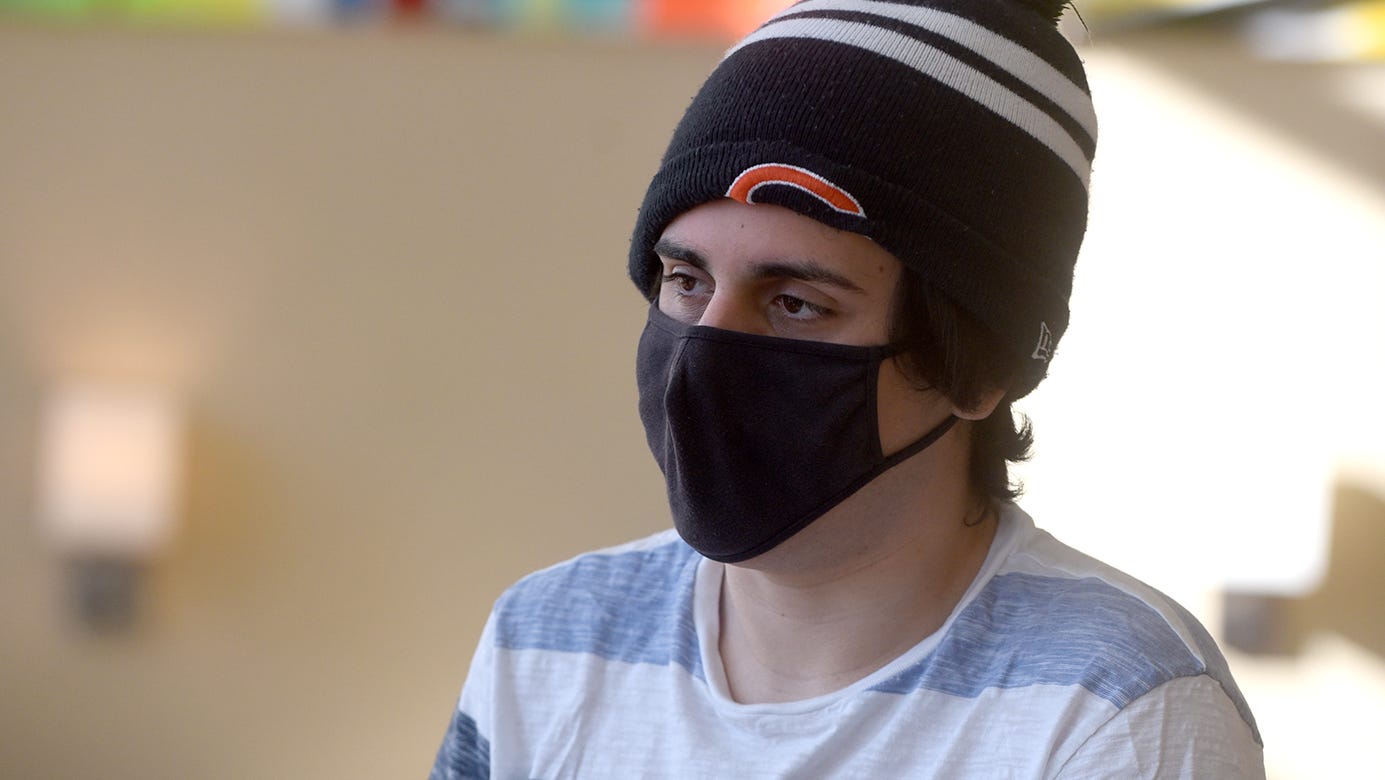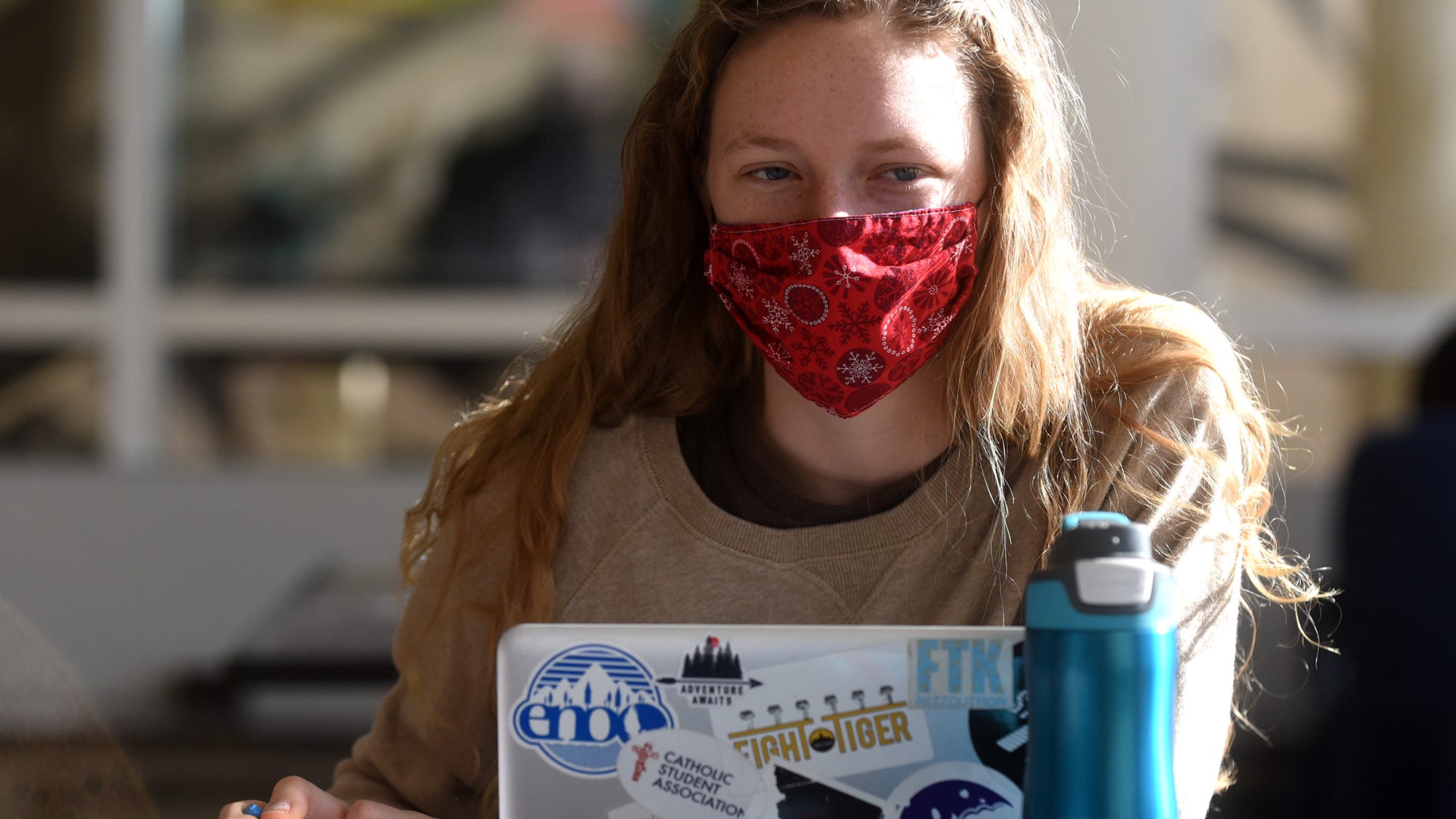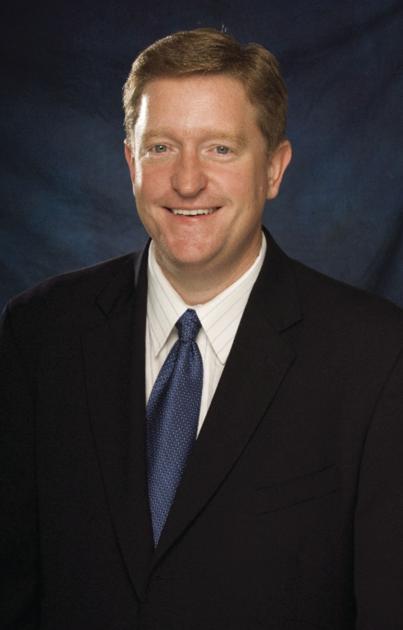The University of Missouri delivered on its promise of an on-campus experience for the fall semester, students and officials said, but they also acknowledged a need for adjustments during the pandemic and room for improvement.
The semester ends this coming Friday.
Professors have shown a lot of flexibility with students, said Frannie Wilkinson, 24, a graduate student in nutrition science from Kansas City. She and other students interviewed were studying in the MU Student Center.
“Lots of professors have been really understanding,” Wilkinson said.
Students have had difficulty staying focused on a computer screen, she said. She was a teaching assistant for a class of 700 students and said she could tell how much difficulty some students were having. She tried to be as understanding as her professors were, she said.
She quarantined for two weeks in off-campus housing when her boyfriend caught COVID-19, she said.
Working in a lab, Wilkinson said she’s usually on campus. She thinks things will improve in the spring semester.
“I’m hoping we’ll proceed with caution in the spring” while still listening to health professionals, she said.

The university established several layers of risk mitigation before students returned for the fall semester, said John Middleton, professor of veterinary medicine and a member of the team that developed plans for the fall semester.
“The strategies we’ve had in place focus on education about the disease” including wearing a mask and social distancing, Middleton said. “We’ve modified our plans as we’ve needed to.”
The pandemic at MU is similar to what has been found at other large, residential university campuses, he said.
As of Friday, the university had reported 2,620 cases among students and four student hospitalizations. As classes began, MU reported enrollment of 30,849, meaning roughly 8.5% of the student population contracted COVID-19 during the semester. The numbers cannot paint a full picture, however, without the presence of mass testing of the student body.
Active daily student cases peaked on Sept. 5, when the university reported 683 active student cases.
There hasn’t been mass testing of students, as there has been at some other universities, Middleton said. Instead, testing is conducted on students with symptoms or students who are close contacts of people who test positive even if they have no symptoms.
“The target populations that are symptomatic, we have tested,” Middleton said. “A large number of close contacts who are asymptomatic, we have tested.”

Jacob Infante, a sophomore business major from Plainfield, Illinois, tested positive for COVID in October and isolated in off-campus housing for two weeks. The 19-year-old business major said he had a mild case and was able to get his school work completed. All his courses were online.
Someone with MU Health Care contacted him a few times during his isolation to check on him, he said.
More accessible COVID testing on campus for students is needed, he said.
“I had to go off campus and use my own insurance to get that,” said Infante, 19. “I think that’s one area they can try to improve.”
The MU Health Care assessment line at 573-815-0948 allows students a free assessment to determine if they should be tested, said MU spokeswoman Liz McCune.
“If someone is symptomatic, they should be able to get a test,” McCune said. “It’s billed to their insurance. If they don’t have insurance, the fee is waived.”
Infante gives the university high marks for some other mitigation measures.
“Mizzou’s done a good job of promoting social distancing in dining halls and public spaces,” Infante said, speaking from the MU Student Center, which also has social distancing measures in place. The Student Recreation Center also enforces social distancing.
“I do feel they could have done a better job of enforcing the mask policy, especially early in the semester,” he said. He’s seen a lot of students without masks, but fewer more recently.
Improvement in the spring semester will depend on many things, he said.
“Do I think things are going to get back to normal?” he said. “I don’t know.”

There were adjustments, but the university came through, said Theresa Scheier, 19, a sophomore from Lee’s Summit.
“I’m really glad that I was able to be on campus,” the biochemistry major said. “Just to be able to come back and still make connections with people is important. There were still options for things to do on campus.”
The university made a mistake when it limited hours in the dining halls over Thanksgiving, she said.
The university had just one dining hall open Thanksgiving weekend, from noon to 4 p.m. Saturday and Sunday. The university added hours at the four campus dining halls after student complaints began making waves on social media.
Next semester, four of her seven classes will be on campus, she said.
“You just get to actually see your peers,” Scheier said.
With online courses, she doesn’t even know what one of her professors looks like.
The university has many case investigators and contact tracers who are able to closely track cases on campus and also assist the Columbia/Boone County health department as it works to catch up, Middleton said.
“Unlike some college towns, we’ve maintained a good relationship with the health department,” Middleton said. There is cooperation between the agencies.
In conjunction with the MU Alumni Association, the university decided to cancel the Homecoming parade and other in-person Homecoming events, said spokeswoman Kristen Smarr.
“I think we’ve been really innovative in finding ways to keep our community connected,” Smarr said.
Most in-person classes were canceled after Thanksgiving break. Students who traveled home for Thanksgiving were asked to stay home until the start of the spring semester.
“Part of our strategy from the beginning has been to monitor the public health data,” Middleton said of the decision. That includes the burden on hospitals.
A few weeks before Thanksgiving, conditions looked good for continuing in-person classes after Thanksgiving, but that changed within a matter of days, said MU spokesman Christian Basi.
“We had to make a different decision,” Basi said. “We’ve got fantastic experts on campus to make sure we have the necessary information to make these decisions.”
A third of students in student housing remained on campus after Thanksgiving break, Basi said, or 2,200 students.
Flagrant violation of campus rules resulted in the expulsion of two students and suspension of three students in September. There were no similar cases during the semester because that measure clearly communicated how seriously university officials take the violations, Basi said. Other violations have resulted in 936 referrals to the student accountability office.

Financial challenges may still face the university, said Rhonda Gibler, vice chancellor for finance.
The first priority has been safety, which itself has increased costs, she said. Federal funds have helped defray some costs; MU Health Care will receive $2 million in federal CARES Act funding to be distributed by the Boone County Commission.
There is a continuing decline in athletics revenue.
“Attendance has been drastically impacted” in athletics, Gibler said.
State funding is in question, she said.
“Time will still tell what the overall impact is and if we need to brace ourselves for a smaller state allocation,” she said.
What about improvement in the spring semester?
“You’re seeing planning in action,” Basi said. “Obviously, this is new territory for everybody. We are getting ready to gear up for the spring semester.”
Planning for the spring semester again will involve consultation with public health professionals and monitoring data daily, he said.
573-815-1719

